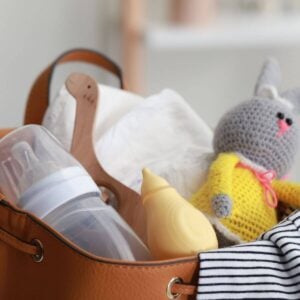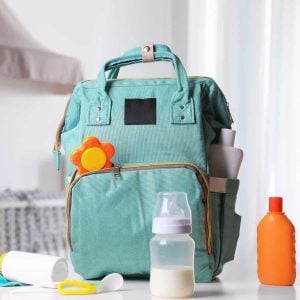Once I got past the initial nipple pain and “How the hell do I do this?” part of breastfeeding, I finally felt like I had nursing all figured out. And then wham! our precious girl seemed insatiable, and I had no idea what was going on. This non-stop desire to eat, I would soon learn, was something called “cluster feeding.”
I didn’t care what it was or what it was called, though, all I really wanted to know was how LONG does cluster feeding last?!
I’d gone from feeling like I’d regained some control during my postpartum journey to being trapped on the couch for hours while our girl screamed at me every few minutes to eat!
Exhaustion was setting in, and I suddenly felt like my breasts were the exclusive property of a screaming baby.
I panicked and assumed I was doing something wrong, wasn’t making enough milk, or, worst of all, that my baby was “broken.”
Thankfully, though, none of these things was true.
Cluster feeding is a normal part of the newborn experience. While we moms might lose our minds a little during the process, it’s not usually something to be nervous about (although that’s easier said than done, we know!).
Are you wondering if your baby is going through a cluster? Do you want to know what all these extra feedings are about? We have the information you need to survive your cluster feeding newborn!
Check out the information below to find out why babies cluster feed in the first place and what you can expect while they’re going through it.

This site contains affiliate links, meaning that we earn a small commission for purchases made through our site. We only recommend products we personally use, love, or have thoroughly vetted.
- What is Cluster Feeding? (And Why Do Babies Do It?)
- Do Babies Cluster Feed if They Drink Formula?
- Are Cluster Feeds the New Normal for Your Infant?
- Surviving a Baby Cluster: Tips and Tricks for Managing the Experience
- Should You Contact a Lactation Consultant or Your Baby’s Doctor?
- This Too Shall Pass – Remember Cluster Feeding is Only Temporary
What is Cluster Feeding? (And Why Do Babies Do It?)
Did you know that, on average, most babies eat 8-12 times a day? That’s approximately once every 2-3 hours. During newborn cluster feeds, however, you might catch your little one wanting to eat every 30 minutes instead!
Cluster feeding is when a baby temporarily stops going longer periods between eating. Instead of spacing them out like normal, they’ll suddenly increase the frequency of their hunger cues and want to nurse or bottle feed more.
Often, this starts around their 3-week birthday and might strike again around six weeks.
In many cases, you might notice your baby’s cluster starting during the later afternoon or early evening hours.
While cluster feeding can lead to increased fussiness, the experience doesn’t usually indicate something “wrong” with your baby. Actually, it’s more common than you think! Sure, not every baby will end up cluster feeding, but the vast majority will at some point. Some might even cluster on a daily basis.
Despite the normalcy of cluster feeding, the reasons why each baby does it can vary. Here are some of the most common:
1. Increasing Milk Supply
Breast milk is all about supply and demand. Whether breastfeeding or exclusively pumping, the more your baby wants and needs, the more your body will produce.
During those early weeks when you’re establishing a breastfeeding routine, cluster feeding is a fantastic way for your baby to help boost your milk production to ensure they’re satisfied and getting enough calories.
Note: Just because your baby is working to increase your milk supply doesn’t mean they’re not getting enough breast milk. It’s a common misconception that cluster feeding is caused by low milk production.
2. Growth Spurts
Around three weeks, six weeks, three months, and six months, your baby will likely experience growth spurts. These growth spurts often lead to fussy babies, and many will want to eat more often than usual.
3. Comfort Nursing
This one often goes hand-in-hand with a baby’s growth spurts. Since little ones are usually more irritable during growth spurts, they’ll likely want any extra comfort.
Experts from HealthyChildren.org say that nursing helps calm babies because they’re comforted by the smell of their mama’s skin, the sound of their heartbeat, and even the taste of their breast milk.
Do Babies Cluster Feed if They Drink Formula?
Absolutely! While cluster feeding is more common in breastfed newborns, that doesn’t mean formula-fed babies don’t partake in the practice.
If you notice your baby is suddenly insatiable shortly after a bottle of formula, there’s a good chance they’re cluster feeding. Just be careful not to overfeed them. Since infants take longer to digest formula, it’s easier for them to overeat.

Are Cluster Feeds the New Normal for Your Infant?
When it suddenly seems like you’re stuck on the couch for longer stretches and trying to survive your little one’s cluster feeding sessions, you might be panic-Googling phrases like, “How long does cluster feeding last?”
Here’s the good news! Newborn cluster feeding usually only lasts for a short time!
While all babies are different, most of the time cluster feeding only lasts for a few days at a time. Each day, your baby will likely only cluster for a few hours. It might feel like it will never end while you’re in the moment, but we promise it will pass!
Surviving a Baby Cluster: Tips and Tricks for Managing the Experience
So, are you looking for ways to survive your baby’s frequent feedings? We’ve got you covered! If you start noticing a cluster pattern, try these tricks to make the experience less stressful and more manageable.
1. Practice Babywearing During Cluster Sessions
One of my biggest complaints during our daughters’ cluster sessions was that I couldn’t do anything else. Cooking, cleaning, and other household tasks felt nearly impossible with a baby literally hanging off my breast.
That’s when a brilliant friend suggested I babywear them during those periods. If you don’t have a newborn baby carrier, wrap, or sling, now might be the time to get one!
2. Use White Noise
Irritability is often a common denominator during cluster feeding sessions in the later afternoon or early evening.
While nursing can help soothe your baby, white noise can be equally effective. White noise mimics the sounds babies hear inside your uterus during pregnancy; this is why it’s such an excellent option for relaxation.
3. Make a Nursing Station
Whether it’s a spot near your couch or your bedside table, why not create a comfortable area for breastfeeding inside your home? This way, you can at least be stuck in a place you like during your kiddo’s cluster schedule. Some popular items to include are:
- Breastfeeding Snacks
- Water Bottle
- White Noise Machine
- Cell Phone Charger
- Tablet
- Book and/or Magazine
- Headphones to listen to an audiobook
- Nursing Supplies
4. Let Your Partner Help
No matter how long your baby’s cluster lasts, there will be breaks between feeding sessions, so you don’t have to hold them that entire time!
Even if they’re fussy, it’s okay to take a break. Trust me; I felt like I was losing it some days when our girls were cluster feeding. I was more than willing to hand them off to my husband between feeds. He might not have had the liquid gold they yearned for, but he had a perfectly good pair of arms for snuggling and bouncing!
Should You Contact a Lactation Consultant or Your Baby’s Doctor?
No matter how often someone tells you that cluster feeding is normal, especially for breastfed babies, you’re not alone if you stress over whether or not something could be wrong.
I know I had moments where I was convinced my baby wasn’t getting what she needed from me.
If you’re ever concerned about your baby’s behavior or eating patterns, don’t hesitate to call your doctor or a certified lactation consultant.
As a general rule, though, no matter how long cluster feeding lasts for your little one, the most important thing is to watch for signs they’re getting enough to eat.
These include:
- the number of dirty diapers they have each day,
- they’re gaining weight,
- and they seem content right after a feed.

This Too Shall Pass – Remember Cluster Feeding is Only Temporary
The cries of an insatiable baby and the feeling that you’re constantly whipping out your boob or making bottles can be exhausting, but cluster feeding is far more common than we realize.
And if you’re anxious about it, all you need to do is contact your doctor or lactation consultant to make sure baby is getting enough to eat. It’s always okay to reach out if you feel like you don’t know what you’re doing!
The good news is that cluster feeding only lasts for a little while, and you’ll get some extra baby snuggle time while you’re feeding. Hang in there, mama!
How long did cluster feeding last for your family?










